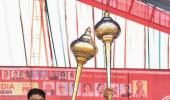Electoral setbacks and thwarted ambition can have an unpredictable effect on leaders, observes Aditi Phadnis.

When the past illuminates the present, it is truly a moment of epiphany.
Shyamlal Yadav records in his book: The year was 1999 and Atal Bihari Vajpayee's government had been defeated by one vote.
Elections were held in September-October and after counting was complete, the BJP's Lok Sabha seats from Uttar Pradesh had fallen to 30 out of 85.
However, Vajpayee had managed to retain the parliamentary tally of his party at 182 and had taken oath again as prime minister, at the mercy of a complicated system of alliances.
Sound familiar? Kalyan Singh was UP chief minister at the time. Relations with Vajpayee were not cordial.
So when he was summoned to Delhi for a review meeting along with Rajnath Singh, Lalji Tandon and Kalraj Mishra, he decided not to attend and went to Ayodhya instead where he criticised Vajpayee publicly for not fulfilling the Ram Mandir promise.
He was stripped of the chief ministership and the Bharatiya Janata Party leadership (that wanted to strike but not wound him for fear he might leave the party) replaced him with the venerable Ram Prakash Gupta as CM.
Kalyan Singh resigned in November, 1999. Days after that he attacked Vajpayee terming him a "'onspirator, liar and a mask of the BJP'.
He followed this up with another charge: That for the past year, Vajpayee and other upper caste leaders had been conspiring to dethrone him from the CM's post because he belonged to the OBCs.
He was expelled from the BJP, formed his own party and in the 2002 assembly elections performed below par but damaged the BJP so much that the Samajwadi Party came to power -- which he supported, becoming a minister in the Mulayam Singh-led state government, along with his son, and associate Kusum Rai.

The parallel to the political conditions today is admittedly not exact.
But electoral setbacks and thwarted ambition can have an unpredictable effect on leaders.
Just saying. It is for meticulous recounting of incidents like this that this book is so valuable.
The author has laid out the volume as a political history of UP's CMs beginning with Gobind Ballabh Pant.
He explains the importance of UP in national politics -- not just for its centrality in the Lok Sabha but also for the role the state plays in the rise and fall of political parties.
It can't have been easy to write the story, as it traverses by-lanes of history with unexpected twists and turns and a wrong turn in narration can end up in a blind alley.
But Mr Yadav has pared it of all but the essential facts and has relied only on sources that can be accurately documented -- such as the proceedings of the UP legislative assembly, authorised biographies of CMs, published interviews, and his own reporting on the state.

Multiple terms of individual CMs have been analysed in the context of extant political conditions.
For instance, Chandra Bhanu Gupta's tenure is marked by upheavals in the Congress, the problems of succession, resentment and suspicion at Nehru's plans to hand over the party's leadership to his daughter Indira Gandhi, and the rise of the Syndicate that asked CMs to decide whether they were in the tent or out of it.
This theme recurs through UP's history.
Even the longest-serving CMs of the state -- Mulayam Singh Yadav, in office for more than six years, and Mayawati for seven -- had to juggle foes in their party with the help of allies from the Opposition.
It makes you wonder: How could CMs have the authority to rule and govern when they were so unsure of their tenure? Amazingly, CMs did more than just fend off challenges to their position.
The book notes Sucheta Kripalani's contribution to UP's version of the Green Revolution; Charan Singh's encouragement of Urdu as a language in state administration; Kalyan Singh, Vir Bahadur Singh and V P Singh's initiatives to curb gangs and gangsters in politics and the way the dark empire hit back when Rajnath Singh's move to end copying in examinations led to a perverse backlash, with the pass percentage in examinations dropping so precipitously that students and parents just wanted him out!

The sterling quality of this book is that it is factual.
It passes no judgement on CMs except by the parameters they may have set for themselves.
For instance, it notes their handling of communal riots while describing the role played by the Provincial Armed Constabulary (PAC), possibly the only law and order force in an Indian state that has seen mutiny.
The PAC's part in the killings of Muslims in Meerut and Maliana is discussed without editorialisation.
This is important because law and order is the responsibility of a state government and the buck stops with the CM.
The book discusses the changes in the handling of law and order by Mayawati, Akhilesh Yadav and briefly the 'bulldozer' politics of current UP CM Yogi Adityanath.
UP has seen other phenomena as well: Such as having a CM for just one day, (31 hours to be precise) and therefore being stripped of the privilege of calling himself 'former' chief minister.
Jagdambika Pal's 'tenure' in 1998 was a result of gubernatorial overreach and instability at the Centre.
The author has tagged Pal's 31-hour stint as CM to the account of Kalyan Singh's chief ministership.
This is an extraordinary book for its insights into the way UP's CMs addressed challenges of governance, faction-management, and administration in such a vast state.
The 2024 Lok Sabha election has proved that UP continues to hold the key to politics at the Centre.
The coming days will tell us the exact trajectory.
Feature Presentation: Aslam Hunani/Rediff.com










